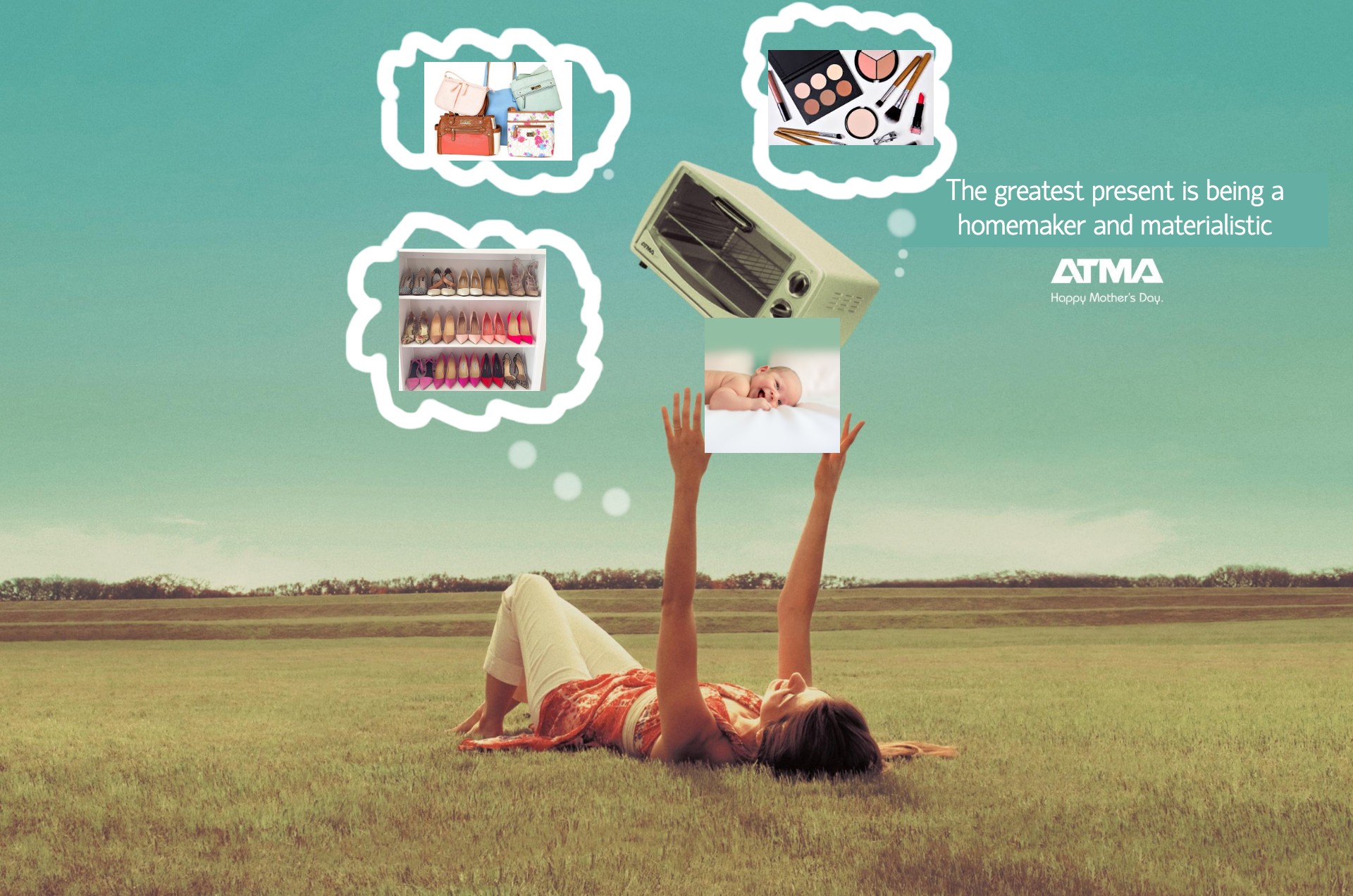Original ad:

Photo from http://www.adeevee.com/2007/10/new-san-atma-home-appliances-mothers-day-print/
In October 2007, ATMA released a print ad for Mother’s Day. ATMA is a Home Appliances brand that is founded in the 1930s from Argentina. The message on the ad stating that “the greatest present can never replace you” illustrates the toaster oven being the perfect gift for the mother from her children. Furthermore, the action of the mother throwing up the toaster oven, like a parent would do for a child, demonstrates how a mother would love an oven just as much as she would her own child. This ad demonstrates two main issues surrounding gender roles: how women are seen as homemakers and having maternal instincts, and how women are assumed to have materialistic desires.
This ad illustrates how women are supposed to be a homebody. The image also shows women having maternal instincts, as the action she is making mimics one that is of a parent playing with their toddler. Although it is an ad for Mother’s Day, it is an issue to assume that just because she is a woman, she would have maternal instincts. In this sense, it is the women are seen as the ones who are supposed to be taking care of the children. It is ironic that she is in an open field because the ad is catered towards women enjoying being at home and working in the kitchen, especially since she is seen so delighted by the home appliance.
Secondly, this ad is problematic in the sense that it assumes women have materialistic desires. The image highlights how happy the woman is when she receives a kitchen item and blatantly implies that this generic household object is the greatest gift a mother can have, next to her child. The comparison of a kitchen appliance to a child also shows the intense desire for material goods, as it supposedly brings the same joy as a child would. This raises so many questions because it is condescending towards women and just furthers the stereotype of women having to take care of the household and being highly invested in materialism.
Jammed ad:

My jammed philosophy acts to reveal the stereotypical gender roles highlighted within the ad. Not only does it show how women are homemakers for being so enlightened in kitchen appliances, it also demonstrates how they are materialistic as these objects bring them happiness. For that reason, my altered text says that “the greatest present is being a homemaker and materialistic”. I decided to keep “Happy Mother’s Day” in the subtext because there is another issue that when women get married, their role within the marriage is to be at home with the children and chores. Moreover, I added images of shoes, purses, and makeup as some examples of consumer goods that women are stereotypically invested in to further demonstrate the materialistic nature that women are stereotypically portrayed to have.
My jammed ad reveals that women’s materialism are just as intense as their maternal instincts. With the woman throwing up the oven like a baby, women are seen to value material goods just as much as they would value having children. It also raises an issue of women supposedly having maternal instincts, just because they are women. I placed a picture of a baby where the oven is to demonstrate the level comparison between women’s materialistic and motherly desires. It should not be the case that these factors should be gendered expectations in the first place.
I do want to acknowledge that my culture jamming is not very multi-faceted. Discussing solely issues about “gender” is quite single-cause as this ad caters to a more “westernized” and “middle-class” experience of being a mother. For example, black feminists from The Combahee River Collective have not only been fighting to deconstruct gender roles, but they advocate for anti-racism, anti-poverty, and other social justices that they experience as well, being women. It is important to note that although deconstructing gender roles is extremely important, it is also crucial to view feminism from different lenses, all together in an intersectional approach.
Works Cited:
The Combahee River Collective. (1977/2014). A Black Feminist Statement. Women’s studies Quarterly 42(3-4), 271-280.